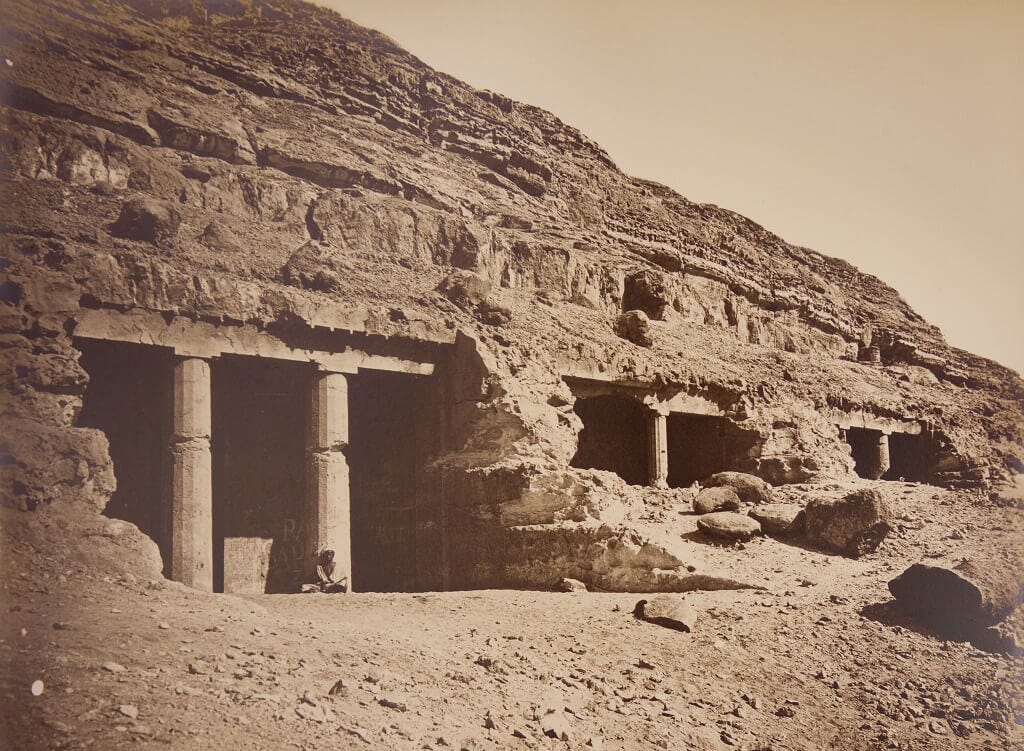The birth of God
> For each fire is all fires, and the first fire and the last ever to be.
The temples of the gods have fallen to ruin; their bodies do not endure. Since the time of the ancestors, it has been the wise man that knows these things. Behold, I, the king, am speaking so that I might inform you concerning the appearances of the gods. I know their temples and am versed in the writings, specifically, the inventory of their primaeval bodies. And I have watched as they have ceased their appearances, one after the other. All of them have stopped, except the god who gave birth to himself. And no one knows the mystery of how he performs his tasks. This god goes where he pleases, and no one else knows his going. I approach him, the things which he has made. How exalted they are.1
I sit here same as every night, sandstone walls flicker in the torchlight. This house is silent but for the wind’s whispering somewhere in the sands beyond; with dark lips carved from dunes, tonight she speaks to me.
Her speech never resolves into units let alone meaningful words, instead presents me with pictures; a play. She shows me first a point of infinite blackness, a dark orb beyond anything known to earth or sky; it is unnaturally still. This is the beginning.
At first faint perturbations on its surface and then—light explodes, blinding me instantly. I bite my tongue, taste blood; it is all I can do not to cry out. Priests move quietly among the columns. They would come running, and what could I say to them?
Still blind yet my sight begin to adapt, she has continued to whisper all the while in the absence of eyes. She spoke of images beyond sight, of a principle that cannot be seen; the possibility of seeing itself. I feel implicit a promise, that I may hear its name.
The fire rages a thousand years, I watch the world form and feel myself drawn into being. Inevitability drags me forcibly into existence, all the way to the point here at which I will witness my own birth; see myself seated now amidst flickering torchlight.
I am sitting there, here, half-bent eyes closed as she continues whispering ever more softly—but I will hear no more this night. I am filled with light overflowing, could not contain more even were it offered. She speaks to others now, somewhere in the dark.
Sleep comes slowly this night, slower yet than days gone by. I had dreamt nightly of the sand which surrounds, that from which these walls were built; in the sand I hear a mother calling her children, the inevitability of every block’s return. I woke with fear.
This night I do not dream, my closed eyes see only light. The underworld, death—all this has been forgotten; it is the first morning of my true name. Eyes open to a light no less than that which beats behind their lids, a new world bright at last with youth.
That the world was somehow less than it had been, this I felt even in my fathers time. My ascent was marred by this sense: that ours was a time of decline. The priests had no answers for me; they had not been writing long enough for books to see so far.
Some Hindu sages once came to me, hearing of my plight; each spoke in turn of vast wheels upon which the world turned, of day and night. They had other names but the faces were somehow familiar; that night would promise day, that much we also knew.
I had sought that evening, as ever, some answer in the words which were my body and soul, that I saw clearly the shape of this realm; a universe wrought of papyrus and stone. I saw the ink before me, felt how easily it could alter the shape of this world.
A single moment, a few soft scratches in my hand could tear apart the world or rebuild it as I saw fit. This power of mind over paper, of paper over men; it was this which my ancestors first enacted, which had brought about the great pyramids.
This ink, this blood—where did it come from? The principle of my strength, yet this font was now failing me; everywhere in this realm it met with some resistant force. A world once malleable had begun again to assert itself, that our magic was dying here.
Her words that night showed me the way, that I had followed the veins of ink and blood through time; in their creation had seen the whole concretely interwoven, each tracing its lineage through light unto the first—not the disc above but this, the first.
Few of the priests would understand this, less of the people; necessary then that the truth be garbed first in some symbol before its proclamation. Mercy that one was so readily provided. The shape of Amun-Re is familiar here, but this is not His name.
Aten—yes, now say “He, God, is one. God, the eternally sufficient unto Himself. He begets not; nor was He begotten. And none is like unto Him.”
A version of words attributed to Akhenaten, from a pylon at the Karnak temple complex.


